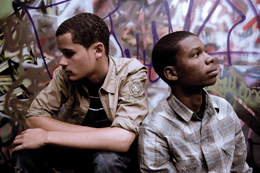The Genisys of Rap
By Bill McMillan
Two student em-cees plan a guerrilla takeover.

Flash back to 2008, freshman year for Jason Adams and Godfrey Henry. They sit in front of a laptop in 119 Kimmel Hall, trading freestyles via webcam and posting them to Facebook. Genisys is born.
As Genisys’ popularity grew, they began the 119 Cipher Series — a Web show named after Adams’ room number — running Fridays at 9 p.m. that featured the duo and other campus hip-hop talent. The project garnered more fans with each passing week.
2009 — Adams (A.C.E.) and Henry (Da God 6EE), now sophomores, live on Slocum Heights, South Campus, just a few miles from where their venture first began.
Both emcees were born in 1990, in the middle of what The New York Times deemed “the golden age of hip-hop,” a period that began with Run-D.M.C.’s commercial breakthrough in 1986 and ended when Dr. Dre released The Chronic in 1992, jump starting the gangster rap phenomenon. This era had an incalculable influence on Genisys’ sound.
Adams and Henry describe their sound with two words: quality and diversity. Maintaining these standards, the tandem seamlessly jumps between styles, keeping listeners tuned into a singular, Genisys sound. They might go for a more hipster, Cool Kids-angle on one song and a more gangster, Ice-T flow on another.
“We might have a song to talk about our jackets and our Macbooks, we might have a song to talk about something more real, or something more emotional, or something more party,” Adams said. “It all depends what we feel to create at that particular moment, and the quality of the work will determine where it ends up.”
Genisys groups itself with the Hip-Hop Freshmen, which includes acts like Kid Cudi, Wale, Drake, and Asher Roth. Adams attributes this to Genisys’ do-it-yourself work ethic. He stresses that people shouldn’t box the group into just one genre.
Of course, Genisys fits into the broad label of hip-hop, but Adams would feel constrained by any further labeling, saying he would never want his style to be something a listener could pinpoint and say, “That’s A.C.E.’s sound.” Henry agreed, pointing to a recent trend in hip-hop in which artists opened the genre to criticism, not only because rappers became more about gimmicks and less about skill, but also because the music lacked diversity.
“I want them to expect a variety of things from me,” Adams added. “I just rap about what’s affecting my life at that particular moment, regardless of what it may be, and I think that’s a stamp of an artist — to incorporate what’s going on into something enjoyable.”
The emcees have nearly identical motivations for rapping. Adams traveled many different roads before deciding on music, but now he wants to crank it out for the widest audience possible. For Henry, music is timeless, a part of life that affects everybody. If he can do something he enjoys while making a positive impact on people’s lives, that’s enough.
Adams also sees their purpose expanding in the future. He envisions Genisys as providing an avenue for student artists who feel inspired to pursue a music career. Since no one handed Genisys success, they feel a responsibility to provide an opportunity for other new acts.
“As Genisys, we’re going to put in the most work, the most effort that we possibly can,” Henry said. “We just create what we feel is quality and try to make people hear us —that’s our goal.”
That acute sense of quality went into the recording process for their debut EP, Lyrical Exercise Vol.1. They had nothing but a lo-fi rig with a mic, a laptop, and Cool Edit Pro, a digital audio editor program. Both emcees write whenever they feel inspired, with Adams saving a lot of lyrics on his iPhone.
“The way we did that [self-production] kind of showed us who we are as musicians, how we started off doing everything by ourselves,” Henry said.
The first full-length album, For the Love of Music, will sound much more polished. It’s in production at the Newhouse studio, with an expected 2010 release.
Adams and Henry have been putting in long hours to create and market their music — purchasing, designing, and launching their own Web site at www.genisyslive.com, making profiles on every social networking site possible, and forming relationships with important players in both SU’s and New York City’s music scene. However, they’ve found it difficult to display their talent around campus outside of places like Funk N’ Waffles and University Union.
“I think there’s a lot of talent on the SU campus that actually doesn’t get the correct amount of promotion,” Adams said. “There are definitely artists on campus with talent that have the ability for their music to be something special, but don’t get the opportunity to because there’s no avenue for them to push their music.”
Genisys plans to book sets at Funk N’ Waffles, Schine Student Center’s Underground, Goldstein Auditorium, and Westcott Theater. They’ll soon secure a DJ through Cuse Selectors, an organization that spins for parties at Skybarn on South Campus and Club 410. Z89, the student-run radio station that broadcasts out of Watson Hall to the city of Syracuse, has started playing their tracks. Thus far, they’ve only played one live gig, at the Pyramid Club in New York City.
Whether Genisys can reach the same level of stardom as other Hip-Hop Freshmen remains to be seen. Adams said things are looking up, though, because we’re in an age in which you don’t need industry connections to collaborate with top artists. If you have skill and you’re loud enough about it, you’ll command the attention you deserve.
“It’s a very realistic chance of breaking through at this point,” he said. “If everything goes at the pace it’s been going now, I don’t doubt at all that we’ll make it.”
